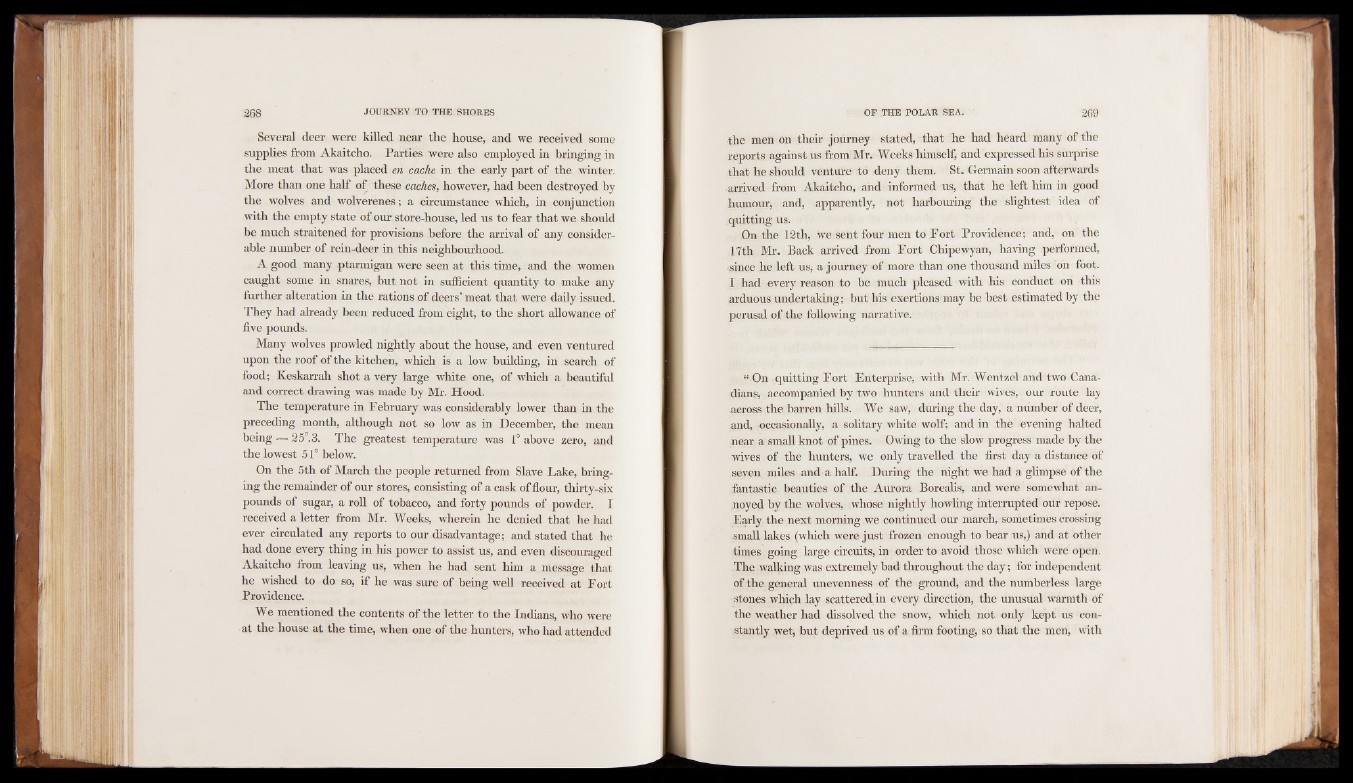
Several deer were killed near the house, and we received some
supplies from Akaitcho. Parties were also employed in bringing in
the meat that was placed en cache in the early part of the winter.
More than one half of these caches, however, had been destroyed by
the wolves and wolverenes ; a circumstance which, in conjunction
with the empty state of our store-house, led us to fear that we should
be much straitened for provisions before the arrival of any considerable
number of rein-deer in this neighbourhood.
A good many .ptarmigan were seen at this time, and the women
caught some in snares, but not in sufficient quantity to make any
further alteration in the rations of deers’ meat that were daily issued.
They had already been reduced from eight, to the short allowance of
five pounds.
Many wolves prowled nightly about the house, and even ventured
upon the roof of the kitchen, which is a low building, in search of
food; Keskarrah shot a very large white one, of which a beautiful
and correct drawing was made by Mr. Hood.
The temperature in February was considerably lower than in the
preceding month, although not so low as in December, the mean
being — 25°.3. The greatest temperature was 1° above zero, and
the lowest 51° below.
On the 5th of March the people returned from Slave Lake, bringing
the remainder of our stores, consisting of a cask of flour, thirty-six
pounds of sugar, a roll of tobacco, and forty pounds of powder. I
received a letter from Mr. Weeks, wherein he denied that he had
ever circulated any reports to our disadvantage; and stated that he
had done every thing in his power to assist us, and even discouraged
Akaitcho from leaving us, when he had sent him a message that
he wished to do so, if he was sure of being well received at Fort
Providence.
We mentioned the contents of the letter to the Indians, who were
at the house at the time, when one of the hunters, who had attended
the men on their journey stated, that he had heard many of the
reports against us from Mr. Weeks himself, and expressed his surprise
that he should venture to deny them. St. Germain soon afterwards
arrived from Akaitcho, and informed us, that he left him in good
humour, and, apparently, not harbouring the slightest idea of
quitting us.
On the 12th, we sent four men to Fort Providence; and, on the
17th Mr. Back arrived from Fort Chipewyan, having performed,
■ since he left us, a journey of more than one thousand miles on foot.
I had every reason to be much pleased with his conduct on this
arduous undertaking; but his exertions may be best estimated by the
perusal of the following narrative.
“ On quitting Fort Enterprise, with Mr. Wentzel and two Canadians,
accompanied by two hunters and their wives, our route lay
across the barren hills. We saw, during the day, a number of deer,
and, occasionally, a solitary white wolf; and in the evening halted
near a small knot of pines. Owing to the slow progress made by the
wives of the hunters, we only travelled the first day a distance of
seven miles and a half. During the night we had a glimpse of the
fantastic beauties of the Aurora Borealis, and were somewhat annoyed
by the wolves, whose nightly howling interrupted our repose.
Early the next morning we continued our march, sometimes crossing
small lakes, (which were just frozen enough to bear us,j and at other
times going large circuits, in order to avoid those which were open.
The walking was extremely bad throughout the day; for independent
of the general unevenness of the ground, and the numberless large
stones which lay scattered in every direction, the unusual warmth of
the weather had dissolved the snow, which not. only kept us constantly
wet, but deprived us of a firm footing, so that the men, with